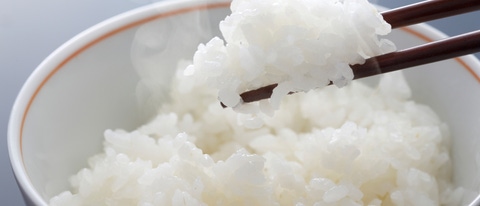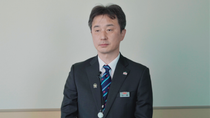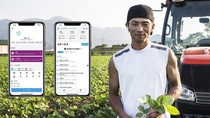Around 500 fields
with less than 0.3 hectars are typically managed by one farmer in Japan.

Agriculture
The perfect storm is brewing over the fertile agricultural lands of Japan: A limited amount of farmable land, and ambitious political targets on reduction of chemical pesticides and fertilizers, at a time when workforce is aging and farm consolidation ongoing. And then, there is climate change. But Japanese farmers are in a unique position to be part of the solution. Digitalization and smart tools enable them to improve crop production, reduce emissions and increase farm resilience.
Masaharu Kawamura used to be a newspaper reporter. Today, the 75-year-old raises rice crops in the Yamaguchi Prefecture located at the westernmost tip of mainland Japan. Kawamura started his career as a farmer at a time in life when others usually think about retiring from the workforce. About twelve years ago, he gave up his career as a journalist and in 2016, he became Director of the agricultural cooperative “Iwaki no Sato”. The cooperative takes over farming the land that had been cultivated by independent farmers in the form of a lease agreement.
Since then, “Iwaki no Sato” has grown significantly. Farm consolidation across Japan was a major factor driving the growth of the cooperative. Even though the consolidated farmland is managed under the cooperative, each of the fields remains small and dispersed – one of the factors that challenge the efficiency of agricultural production. “We grow rice, wheat and soybeans on 238 small pieces of plots of land spread in hilly and mountainous areas,” said Kawamura.
From planting, monitoring growth and health of the crops, fertilizing, treating them with crop protection products up to harvest: planning a season properly and efficiently is crucial – especially considering the complexity that comes with juggling the need of three different crops on numerous growing places and only three young agronomists working for the cooperation.
Additionally, there are many variables that cannot be controlled on the way to a perfect crop: The effects of climate change are impacting farmers like Kawamura across Japan “making all steps of the growing season more challenging. And weather is the most difficult factor to consider in our planning,” he said. “We are working hard to make sustainable agriculture possible. But our traditional farming experience sometimes is not enough anymore. Digital solutions have become of great help. To cope with complex agricultural environments, especially with unusual weather, and make optimal use of pesticides and fertilizers, we need solid agronomic information and data-driven recommendations. That’s why we started to work with digital tools from ZEN-NOH and BASF.”
The partnership with the digital farming experts from BASF is very powerful because we can integrate and improve our digital offers for farmers together.
Since 2021, BASF Digital Farming and ZEN-NOH, Japan’s largest farming cooperative with about 10 million members, are jointly promoting precision agriculture technologies. In doing so, both are supporting farmers to tackle the most pressing challenges of Japanese farmers with the right combination of technologies designed to increase yield, make farm management easier and more effective. “By using digital tools, data, and artificial intelligence (AI) farmers can plan and work more efficiently,” said Masakazu Yamada, President, Agribusiness General Planning Division, ZEN-NOH, Japan. The cooperative is working to develop and disseminate labor-saving and low-cost farming technologies and to promote environmentally friendly agriculture. Yamada emphasized: “The partnership with the digital farming experts from BASF is very powerful because we can integrate and improve our digital offers for farmers together.”
Around 500 fields
with less than 0.3 hectars are typically managed by one farmer in Japan.
One example for this joint, data-driven new offer for Japanese farmers is xarvio® FIELD MANAGER, an AI-based digital crop optimization platform from BASF. It allows cooperatives with more than 200 fields – like Iwaki no Sato – to make faster and more accurate farming decisions over the season and additionally to balance the ecological, economic, and social aspects towards sustainability. Across the entire growing cycle xarvio FIELD MANAGER delivers farmers precise crop management information and recommendations in real time for individual fields or even specific field zones. The digital tool enables more precise application of crop protection products, nutrient management, and automated buffer zones.
A tailored version of xarvio® FIELD MANAGER supports Japanese farmers to make faster and more accurate farming decisions
Tsuyoshi Gomi, who is working as Customer Success Specialist for BASF’s Agricultural Solutions division in Japan, said: “Japan is an important market for BASF, being the first country to launch xarvio FIELD MANAGER in the Asia Pacific region. Japanese farmers need advanced smart tools to address sustainability and changing demography in future. In addition, our engagement with ZEN-NOH is helping to achieve one of BASF’s ambitious Sustainability Commitments – bringing digital solutions to more than 400 million hectares of farmland worldwide.”
As part of the version tailored to the needs of Japanese farmers, specific features are included. They support them to manage irrigation efficiently, and to optimize crop protection by taking seed treatment and seed box treatment into account. A weed management program for soy has been fully adapted for the farming practices unique to Japan. Furthermore, farmers benefit from rice specific maps of biomass, as well as the dynamics of vegetation across hundreds of small fields. Some are less than 0.5 hectares in size. This enables the cooperative to make fertilization timing and dosage decisions for each field or even specific zone within a field. In addition, xarvio FIELD MANAGER can access real-time information about field and crop data from ZEN-NOH’s Z-GIS®, cloud management solution. This allows farmers who use the xarvio® app to easily exchange and manage their farm data in one platform.
About 67 years
was the average age of a Japanese farmer in 2019.
Farmer Ryoichi Akazawa is monitoring his fields using the xarvio® FIELD MANAGER
“In the past, managing all the fields was not only time consuming, but it was also nearly impossible to have an exact overview of the growth and health status of all the fields and crops we grow. Since we manage large fields with a small number of people, we need to improve efficiency by introducing new technologies to tackle the biggest job on earth,” said Ryoichi Akazawa, who grows soybeans and wheat on 130 hectares of fertile land in Hokkaido together with his son.
They both are true advocates for digitalization in agriculture helping them to manage the growing complexity of farming – already looking back at more than ten years of exploring digital possibilities for their farming operations. But with hundreds of new digital farming solutions being introduced to the market each year, it is difficult to find out what solutions to adopt, and when. “First, we used satellite imagery to monitor nitrogen levels of juvenile plants as they develop and then apply fertilizers. But then we saw that we needed a wider array of data on factors like weather patterns, soil types, growing conditions, and crop management complemented with recommendations,” described Akazawa. What followed was a search for possible digital offers also from outside of Japan. “We were excited to hear that the xarvio FIELD MANAGER will be made available for Japanese farmers because it is a state-of-the art, very advanced tool and many farmers around the world have adopted it. After using it only for one season, I can already see the results. It helps me to reduce production costs, the amount of product used and supports to reduce environmental impact,” said Akazawa.
Adjusting practices according to the latest data will enable larger and higher-quality yields while keeping output consistent from season to season and help to produce enough food for an ever-growing population sustainably. Kawamura and Akazawa believe, particularly as a younger generation takes over, that farming is changing, and sustainable farming practices and the use of digital tools will continue to grow. Kawamura said: “It will be a different world for the young generation. I have great expectations for them. We know as the world population increases, it’s more important than ever to find the right balance between producing enough food and taking care of the environment. But I am optimistic that they will succeed.”
Published January 2023
For media inquiries or to repurpose the story, please contact: julian-niclas.prade@basf.com or tanja.rolletter@basf.com

%20FIELD%20MANAGER%20.jpg)